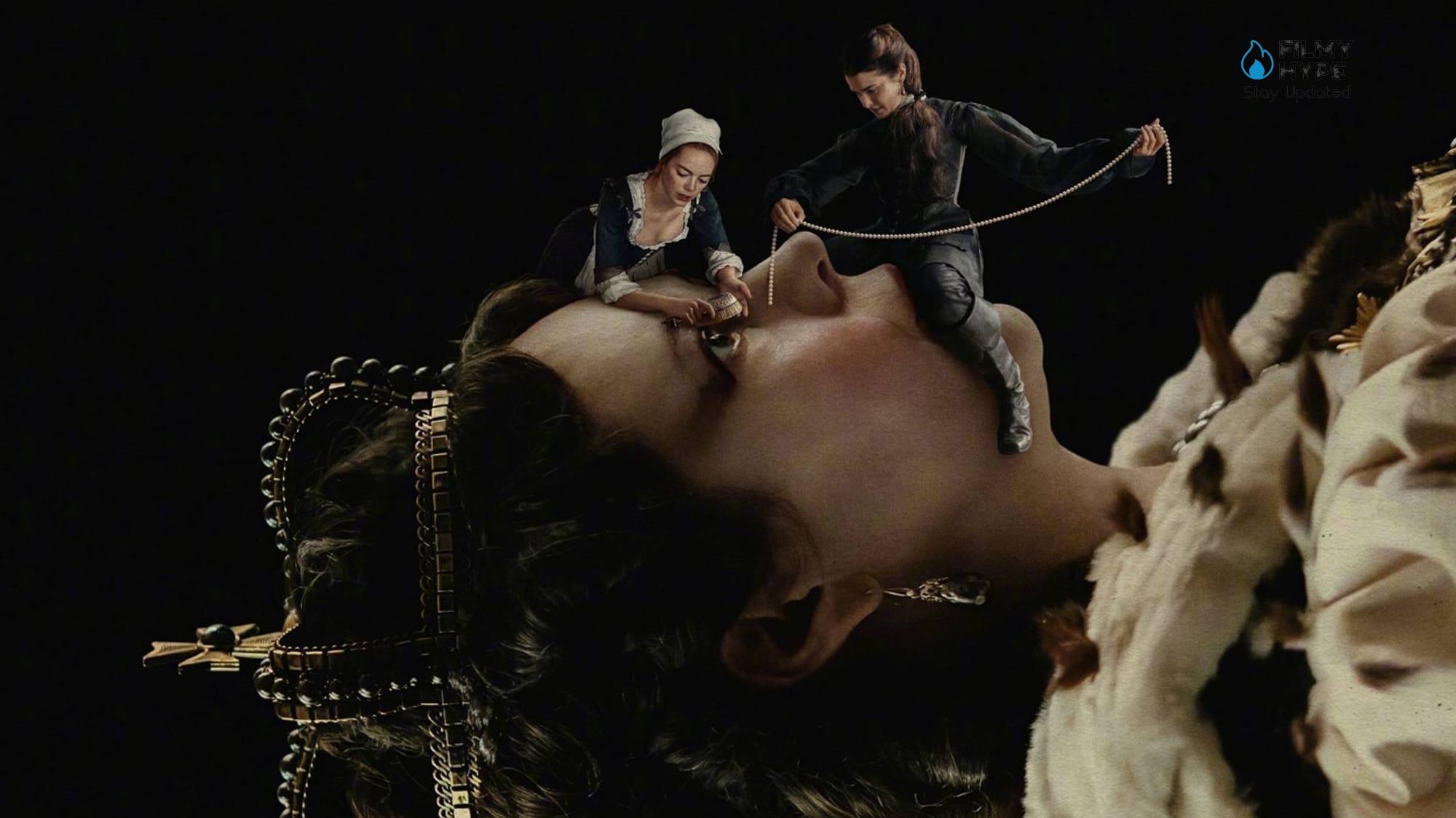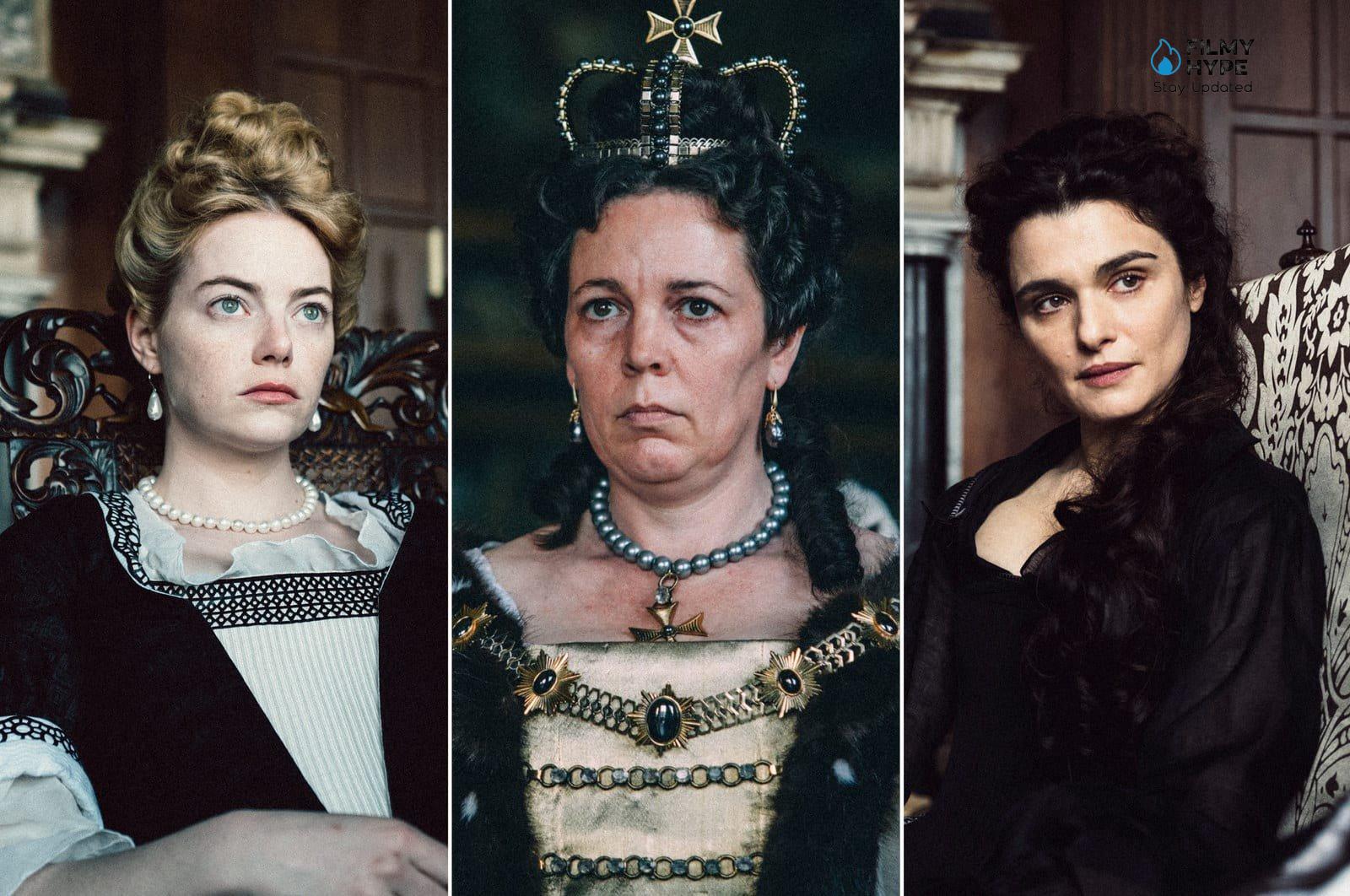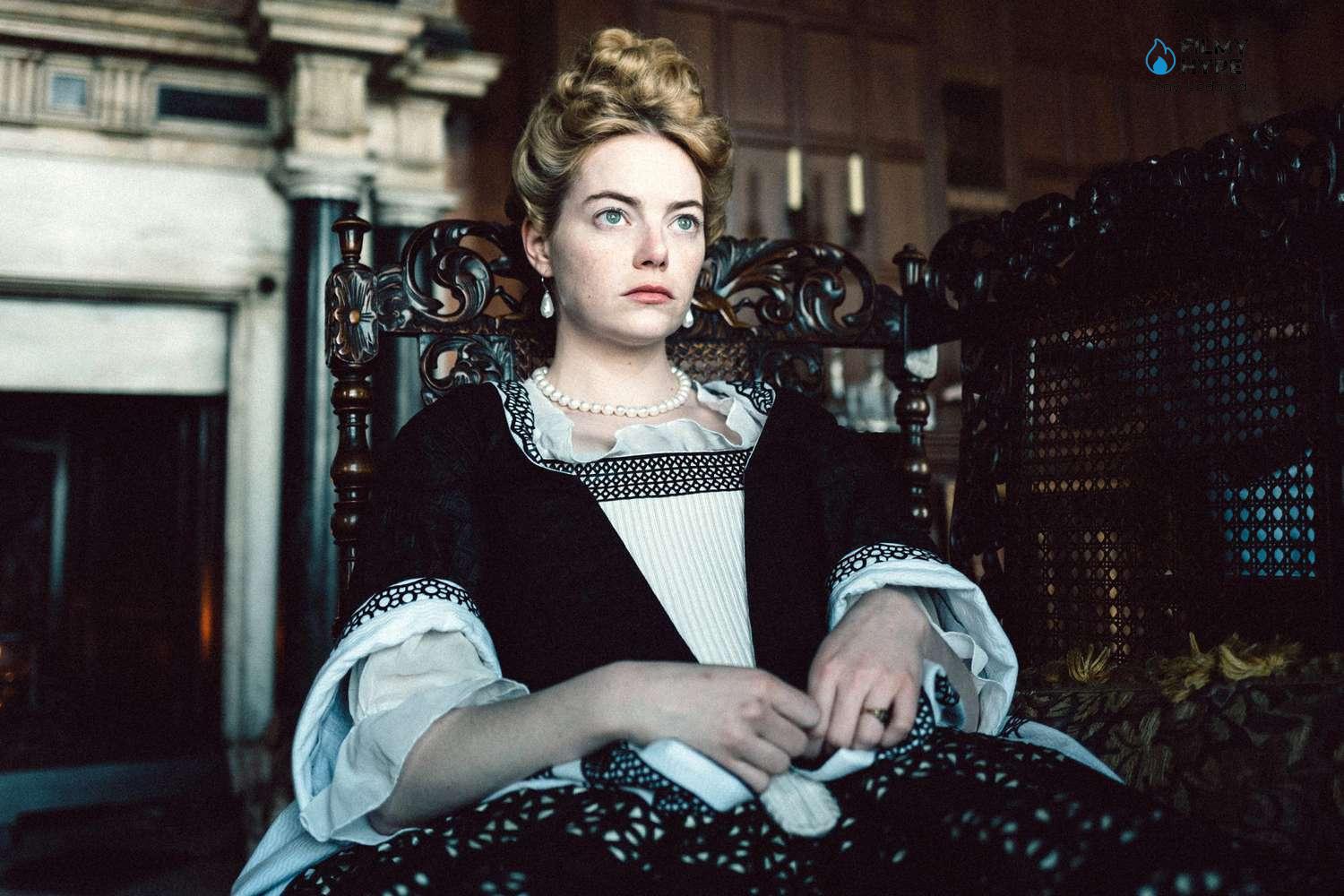The Favourite Movie Review: The Deliciously Cruel War Between Emma Stone and Rachel Weisz
Cast: Olivia Colman, Emma Stone, Rachel Weisz
Director: Yorgos Lanthimos
Streaming Platform: Netflix
Filmyhype.com Ratings: 4/5 (four stars)
The Favourite movie by Yorgos Lanthimos starring Olivia Colman, Emma Stone, and Rachel Weisz. Yorgos Lanthimos – now at the cinema with Poor Things of which you can find our review – is an author destined to divide. His cinema, partly disturbing and visually unusual, can be particularly appreciated or misunderstood to the point of creating a real annoyance. In both cases, however, these are strong emotions that do not provide for a middle ground, much less, mild emotional conditions. This happens because, whatever his approach to his cinema, Lanthimos presents a vision without any kind of commercial gimmick. His events do not at all consider the possibility of reflecting on the possibility of presenting a vision that is as pleasant as possible to the general public. Indeed, each film clearly shows a personal representative taste and a choice of themes that are certainly not intended to reassure. Two aspects, if well harmonized, show the evident traits of a precise authorship which, film after film, has become increasingly central and mature.

An example is also this 2018 film which, as we will see in our review of The Favourite, managed to capture attention for an innovative representative style and which can now be seen again in streaming on the Netflix platform. This is clear from the opening when faced with dialogues that flow with a realistic edge, unlike all of his previous filmography known for its alienating tones. The film flows with great dynamism, without the fixed camera and dilated pace of the past. In short, Lanthimos limits himself to lashing the audience with the content, without punishing them in the form. The perversion and psychological distortion are reflected in the film with continuous wide-angle shots, which replicate certain seventeenth-century paintings that imitate the reflections of convex surfaces.
The Favourite Movie Review: The Story Plot
England, 18th century. After an important victory, the Court and the government reflected on the possibility of starting peace negotiations with France, affected by defeat. The final decision rests with Queen Anne (Olivia Colman). The queen is a weak woman, afflicted by the ghosts of her 17 children who died within hours of giving birth and by attacks of gout, insecure and capricious. Next to her is her favorite Sarah (Rachel Weisz), a friend of the ruler for decades, who skillfully manipulates her emotions and political decisions. Sarah’s naive cousin Abigail arrives at the Palace seeking employment after falling from grace. Having taken a liking to her relative, she will begin to climb the intricate court hierarchies, until she competes for the Queen’s favor. Abigail is ambitious and beautiful, but her rival is a dangerous, power-loving woman.
The Favorite could stop here and already be a great film. Indeed, a rare film in how it places three truly complex female figures at the center, whose emotional and sensual universe is not shaped by the wishes of the male characters, who here are never more than supporting characters. Lanthimos knows how rare it is to make a film of this type, and how The Favorite is a political and feminist choice to make. The story is constructed through the planning of intrigues, alliances, and rivalries between three women: Queen Anne and her ladies-in-waiting, Sarah Churchill and Abigail Hill. This, however, is not a simple story of female rivalry but rather a subtle, intelligent, and not-without-low-blows race to win the most coveted prize: power. The court that Lanthimos describes is an exclusively female hemisphere where men remain relegated to a secondary position. Having established this, however, who has control and management of the internal and external affairs of the palace?

The one who controls the queen appears physically and morally weakened but who, however, hides a capricious strength subjugated only by her pleasure. And it is precisely on these elements that the two young women, Sarah and Abigail constantly act, trying to overcome the other in search of an unassailable position for their future. The former has always dominated the court, taking advantage of Anna’s physical fragility and, above all, of the sovereign’s evident love for her lady-in-waiting. For her part, Abigail represents the new, intriguing charm of the unknown element which, with apparent grace, manages to get closer to the heart of power. She aims to save herself, recover from the fallen condition she finds herself in, and secure a future. The competition between Sarah and Abigail, therefore, can only intensify, leading to manipulation, betrayals, and power plays. While Queen Anne often finds herself indecisive and influenced by the two women, the struggle for dominance becomes increasingly fierce.
The Favourite Movie Review and Analysis
Blessed with a story that enhances his sharp irony and his inexhaustible interest in the most disturbing tendencies of the human psyche, Lanthimos takes full advantage of characters who are both historical and over the top, pushing his hand on their amorality and their emotional excesses. The leap in quality comes when its intent becomes clear: The Favorite lives on the distressing paradox between political and personal dimensions: the fate of a war and the lives of millions of subjects is decided on the emotional wave of the moment, in a series of sentimental spite inserted in a war of nerves in which the weakest summit, Queen Anne, as often happens, also turns out to be the most implacable. Anna, Abigail, and Sarah are involved in a complex and ever-evolving relationship, interdependent on the cruelty of their rivals and the attention of their favorites to define themselves. Emma Stone‘s is a narrative about the loss of morality, seen as an unacceptable strategic disadvantage not so much for obtaining power, but for digging a safe niche.
There is no underlying security, on the contrary. Women – even those in power – live in a reality in which abuse and rape are always around the corner, in which overcoming experiences of this violence is necessary not to prevail, but to survive. Cruelty from necessity becomes pleasure, an acquired taste, as well as that of power. The acquisition and loss of power play tricks on the three: the point of arrival for each of them reveals a character side cleverly hidden from the viewer throughout the film, perhaps the most authentic. The one supported and reinforced by the monarchy and classism of the time. Even the costume drama in the hands of Lanthimos changes skin: the environments and costumes are sumptuous as expected, but they are a symbol to convey the grotesque of an era seen in anything but aesthetic key.
While in external society the feminine still has a complicated and incomplete relationship with the concept of power and its management, Lanthimos tries to complete his revolution by confronting three women in the struggle for domination. The novelty in this case, however, is that the masculine never comes into play except for fleeting moments and always risks becoming a pawn in a game that she does not know and is unable to lead as a protagonist. In this sense, therefore, a tense confrontation is established between Rachel Weisz and Emma Stone to try to manage the power, represented by Olivia Colman‘s crown. The former, therefore, plays the role of confidant and manipulator, whose purpose is to underline the theme of astute politics and tactical alliances in the context of the royal court.

His attitude is often provocative, strong, and resolute, never showing a yield or a glimmer of fragility. On her part, however, Emma Stone, in Abigail’s Land, plays the role of the outsider whose aim is to give shape to a real social climb to exclusively improve his fortune and no longer be a victim of the male world. In this sense, therefore, the character offers an intriguing perspective on the social dynamics of the time and the search for individual power. The circle closes with Queen Anne, played by an incredible Olivia Colman, whose distinctive traits seem to be physical and emotional fragility. Two elements that make her easy prey for her ladies-in-waiting. Although this may be true, however, the woman unexpectedly shows her strength in the expression of her whim, reminding the two women who represent the Crown. From this point of view, therefore, despite representing a government that is substantially indecisive and easily influenced, the character of Queen Anne demonstrates how the line of power is always mobile and indecisive.
Not to mention the compromises one must make to maintain the privileges achieved. So, which of the three will be able to emerge victorious from this dangerous game? The answer is surprising and disturbing given that each one remains stuck in her prison. The queen is trapped in that of a weak fiscal who does not respond to her wishes by having to submit to the insincere attention of others. Sarah, for her part, is ousted and distanced from what she had cared for with particular attention up to that moment. Abigail, finally, shows her true nature without any kind of scruple, and, for this, she is destined for a life of submission to her sovereign, facing the awareness of continuous humiliation to keep her first social privilege intact.
The Favourite, however, would not have the same emotional and representative impact without Lanthimos’ unmistakable style which is expressed in a direction increasingly closer to surrealism and the theater of the absurd. In this film, specifically, the Greek director chose unusual shots, deliberately slow camera movements, and unusual angles. All to create a claustrophobic and intense atmosphere, which fits perfectly with the intricate plot and character dynamics. To all this, then, there is also an artistic and expressive use of sound. This whether it is a musical score or a simple environmental element, clearly characterizes the atmosphere in which the characters are immersed. Specifically, silence is also exploited with particular attention to emphasize the moments of suspense and drama between the three women constantly on stage.

The last essential element, then, is assembly. Thanks to this Lanthimos forges the entire flow of the film himself. Specifically, through unusual editing and sudden cuts, she adds an element of surprise and unpredictability to the film, keeping the audience’s attention high. In this way, therefore, a story with a classical setting and structure is transformed into an emotional and interior journey endowed with great strength and contemporaneity. The aim, moreover, is to highlight a theme, such as that of female power and strength, which goes far beyond simple historical reconstruction. Lanthimos does not let himself be eaten by Hollywood but rather exploits it to create a film full of stars and elegance, no less cruel and cynical than his previous ones. An excellent costume drama: a must-see.
The Favourite Movie Review: The Last Words
Yorgos Lanthimos builds an innovative and unexpected journey on the desire for power and, above all, the pitfalls that these hide. With his always surprising and unexpected style, therefore, he delivers an all-female narration in which the lack of scruples and wickedness make themselves felt with even greater power precisely because they are hidden under a surface of mannerism and fiction. A condition in which the ending strikes at the heart almost like an inevitable and deserved epilogue.







